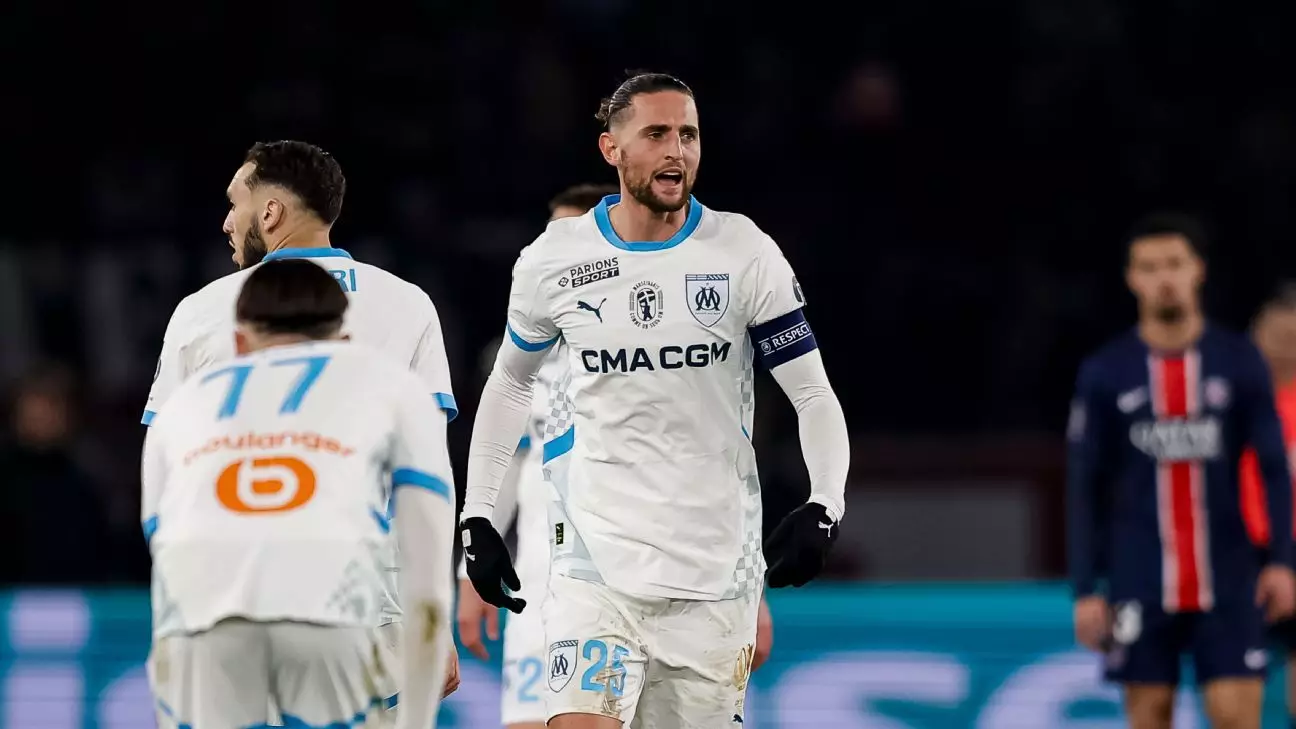In the vivid tapestry of Ligue 1, few rivalries ignite the footballing passion quite like that between Paris Saint-Germain (PSG) and Olympique de Marseille. This storied conflict is not merely about which team possesses the most skill or the best tactical prowess; it is often a cauldron of cultural clashes, socioeconomic divides, and in recent years, an alarming proliferation of discriminatory behavior. The recent encounter which culminated in a 3-1 victory for PSG brought these issues to the forefront, as tensions boiled over in the aftermath of the match. One pivotal voice in this dialogue has been Adrien Rabiot, a former PSG player turned Marseille midfielder, who has offered not just performance metrics, but significant commentary on the deeper issues undermining the sport.
A Social Media Outcry
After witnessing not just the loss, but the hostile atmosphere filled with racist and homophobic chants directed at him and his club from the PSG supporters, Rabiot took to social media to address the disheartening behavior, declaring that “you can’t buy class.” His statement, which resonates far beyond the petty squabbles of sports fandom, serves as a powerful indictment against the rampant culture of discrimination in football. The media spotlight on Rabiot’s words was significant, as it echoed sentiments shared by many in the football community who have grown weary of enduring bigoted displays masked under the guise of rivalry.
Repercussions and Recently Ignored Standards
Rabiot’s mother, Véronique, further fueled the fire by announcing her intent to lodge a formal complaint against the discriminatory conduct of PSG fans, mentioning how the banners targeting both her and her son have crossed the line of acceptable fan behavior. She took issue with the failure of the match officials to intervene at a critical moment when the chants permeated the stadium air. This raises pressing questions about the enforcement of existing policies meant to protect players and fans alike from discriminatory behavior. Despite existing guidelines allowing referees to halt matches in such cases, nothing occurred, underscoring the pervading hypocrisy and apathy that often greets such incidents in contemporary football.
Legal and Institutional Inaction
It is especially troubling that this particular event is not an isolated case. The Ligue 1 landscape has faced similar outbursts in recent years, yet the punishment meted out often appears diluted or nonexistent. The Rouge Direct campaign group has actively called upon French authorities to take meaningful action against these illegal actions, urging policymakers to confront the issues in a more substantial and effective way. Their outcry highlights a pattern of inadequate responses from organized football to tackle the roots of bigotry, which has become more than just an unwanted layer of the game; it is an integral challenge that taints the sport. As long as discrimination festers unchecked in the terraces, the beautiful game’s integrity remains compromised.
The Cycle of Indifference
What renders this whole situation more complex is the cyclical nature of fan behavior and institutional response. PSG’s supporters have a notorious reputation for their discriminatory chants, which have often been tolerated by club officials for too long. The consequences have been minimal; in some instances, sanctions—like the closure of parts of the Parc des Princes—feel more like token gestures than effective deterrents. Disturbingly, this permissiveness fosters an environment where harmful ideologies can thrive, further embedding prejudice into the fabric of football.
Shifting the Paradigm
The issue doesn’t stop at PSG. It begs a significant cultural overhaul reaching across the entire football ecosystem, compelling clubs, governing bodies, and fans to re-evaluate their collective responsibilities. Clubs should actively work to not only condemn discriminatory behavior but to establish robust educational programs aimed at raising awareness about the impact of such actions. The emergence of more outspoken players, like Rabiot, must also be leveraged to create a united front against discrimination in all its forms.
In opening dialogues surrounding these severe inadequacies present in the world of football, one hopes this is merely the beginning of a transformative era where we can witness real change—a movement towards a sport that is not only enjoyed but cherished as a space free from hate. Rabiot’s confrontation against PSG’s leadership represents more than a personal vendetta; it symbolizes an awakening that could alter the trajectory of football in France.

